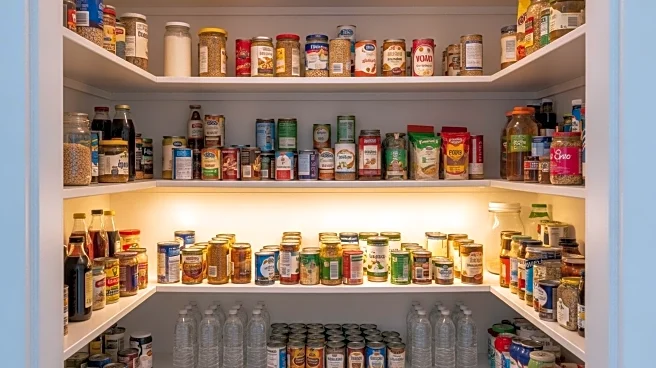What is the story about?
What's Happening?
A recent survey conducted by Novus, commissioned by Lantmännen, reveals that 66 percent of Swedes are worried about food shortages in the event of a crisis or war. This concern has increased from 59 percent last year. The survey highlights dissatisfaction with Sweden's low level of self-sufficiency, as only half of the food consumed is produced domestically. In response, the Swedish government has announced plans to build strategic reserves, a move welcomed by Lantmännen. However, the company emphasizes the need for further measures to ensure long-term resilience, including increased domestic food production and storage of production inputs. Lantmännen has launched the initiative Matvärnet to promote Swedish and farmer-owned products, aiming to strengthen Sweden's food production and preparedness.
Why It's Important?
The growing concern over food shortages in Sweden underscores the importance of national self-sufficiency in food production, especially during crises. With only half of the food consumed being produced domestically, Sweden faces vulnerability in times of crisis or war. The government's initiative to build strategic reserves is a step towards addressing this issue, but further actions are necessary to ensure long-term food security. Increasing domestic food production can enhance resilience and reduce dependency on imports. This situation highlights the broader significance of food security as a critical component of national preparedness, influencing public policy and economic strategies.
What's Next?
The Swedish government and agricultural stakeholders are likely to focus on implementing measures to increase domestic food production and build strategic reserves. This may involve policy changes, investments in agriculture, and initiatives to promote Swedish and farmer-owned products. Lantmännen's initiative Matvärnet aims to raise awareness among consumers about the importance of choosing locally produced food. The success of these efforts will depend on collaboration between politicians, industry leaders, and farmers. As Sweden works towards enhancing its food security, other countries may observe and potentially adopt similar strategies to bolster their own preparedness.
Beyond the Headlines
The issue of food security in Sweden raises ethical and cultural questions about the reliance on imported goods versus supporting local agriculture. It also highlights the potential for long-term shifts in consumer behavior, as initiatives like Matvärnet encourage choosing Swedish products. The focus on domestic production could lead to increased investment in sustainable farming practices and innovation in agriculture. Additionally, the situation may prompt discussions on the role of government and industry in ensuring national preparedness and resilience against global uncertainties.














